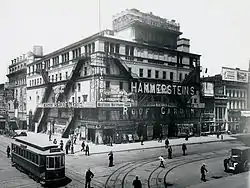Victoria Theatre (Hammerstein's)
The Victoria Theatre was a prominent American vaudeville house during the early years of the twentieth century. Theatre mogul Oscar Hammerstein I opened it in 1899 on the northwest corner of Seventh Avenue and 42nd Street, along New York City's Longacre Square (now Times Square).[3] The theatre was closely associated with the Paradise Roof Garden above it, and the two venues came to be known collectively as Hammerstein's.[4] The Victoria closed in 1915.
Hammerstein's | |
 Hammerstein’s | |
| Address | 42nd Street and Seventh Avenue New York City United States |
|---|---|
| Owner | Oscar Hammerstein I |
| Operator | Oscar and William Hammerstein |
| Type | Broadway, Vaudeville |
| Construction | |
| Opened | 1899 |
| Demolished | 1915 |
| Architect | John B. McElfatrick[1][2] |
Construction
Undaunted by the failure of his massive Olympia Theatre, Hammerstein quickly secured the necessary funds to build the Victoria, purportedly named so in honor of his victory over his enemies. Due to budgetary constraints, the building crew was forced to take several cost-saving measures: the walls were filled with debris from the site’s demolished structure, Gilley Moore’s Market Stables; once erected, the plastered walls remained largely unadorned; and second-hand theatre seats lined the rows of the house.[5] Despite the shortcuts, the press warmly greeted the grand opening; The New York Times deemed the décor “warm and comfortable,” free of anything “grotesque.”[3]
Legitimate theatre and vaudeville
A three-act burletta titled The Reign of Error, featuring the comedy duo of the Rogers Brothers, christened the new stage[3] and ran for at least fifty performances.[6] In the four years that followed, Hammerstein presented ten other productions, one of which, a flop titled Sweet Music, was rumored to be of his own authorship.[5] Not one of these productions, however, was successful enough to solidify a formidable reputation for the fledgling theatre.
In 1904, Hammerstein's son Willie took over operations of the theatre, leaving Hammerstein more time to devote to his first love, grand opera. Willie took the drastic measure of turning the Victoria from legitimate theatre to vaudeville, and over the succeeding years, his risk proved tremendously profitable. Hammerstein's bore the distinction of being one of the few vaudeville houses in the city to operate independently of the virtual monopoly that B. F. Keith and E. F. Albee enjoyed.[7] Headliners included such names as the Three Keatons, the Four Cohans, and the Seven Little Foys.[5] In printed advertisements, the term “direct from Hammerstein’s” was testament to the quality of an act.[4]
Demise
In 1915, Hammerstein sold the theatre to Samuel Roxy Rothafel; however, the transfer of ownership was not a seamless one. A colorful anecdote had Hammerstein wielding a hammer to drive away the wrecking crew.[4] The Times documented, “In Three Reels,” Hammerstein's sordid legal struggle to gain access to his former office.[8]
Roxy wasted no time in gutting the building and demolishing the Seventh Avenue facade. The Rialto Theatre, a movie palace, opened soon thereafter. Nineteen years later, the entire structure was razed and replaced with offices, shops, and a smaller theater.[4]
References
- "Hammerstein's New Venture," New York Times, 18 September 1898
- "Building News," Real Estate Record and Builders' Guide. Vol. 62, No. 1593, 24 September 1898, 418, col. 2
- "Hammerstein's Victoria; The New Place of Entertainment Opened with Every Promise of Success". The New York Times. 1899-03-03. ISSN 0362-4331. Retrieved 2023-08-25.
- “Rialto Theatre to Close Tonight,” New York Times, 15 May 1935, 23.
- Hoogstraten, Nicholas. Lost Broadway Theatres. New York: Princeton Architectural Press, 1997, 41-43.
- “Notes of the Week,” New York Times, 16 April 1899.
- Sobel, Bernard. A Pictorial History of Vaudeville. New York: Bonanza Books, 1961, 69.
- “Oscar in Three Reels,” New York Times, 5 April 1916.
External links
 Media related to Victoria Theatre (Hammerstein's) at Wikimedia Commons
Media related to Victoria Theatre (Hammerstein's) at Wikimedia Commons